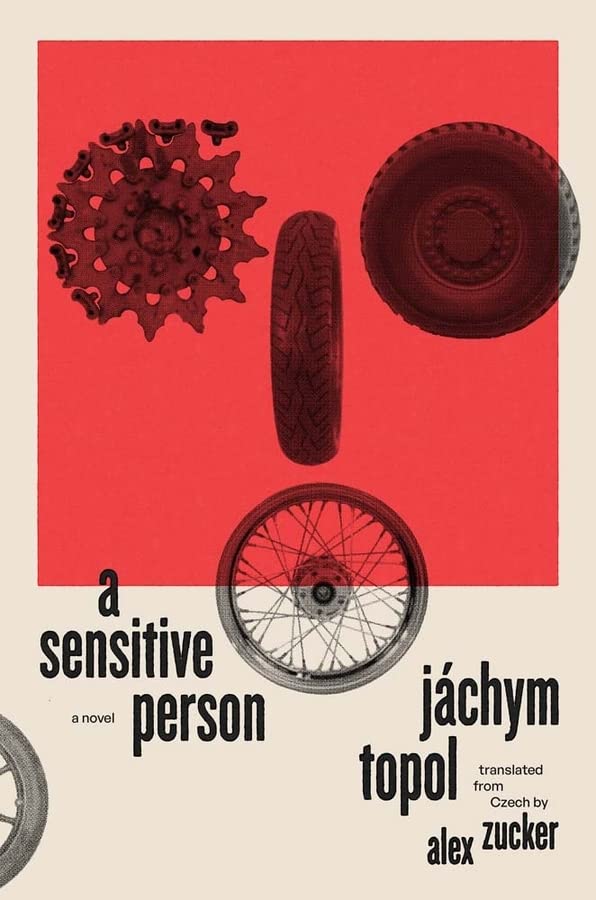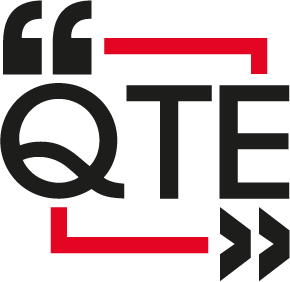In the first of our Translation Exchanges, we were delighted to host eminent Czech novelist, Jáchym Topol, and translator Alex Zucker in conversation with our Translator-in-Residence Polly Barton, on the occasion of the English translation of Topol’s latest novel, A Sensitive Person. Josie Kucera (finalist in Spanish & Czech, Queen’s) was at the event.
On 7th February 2023, the Queen’s Translation Exchange hosted celebrated contemporary Czech novelist, Jáchym Topol, and eminent literary translator, Alex Zucker, for a discussion about Jáchym’s most recent publication, Citlivý člověk. Alex’s translation of the novel, entitled A Sensitive Person, has also recently been published by Yale University Press and was available to be purchased and signed by both author and translator at the event. The novel tells the tale of an itinerant actor, accused of a terrible crime and running from the authorities, whilst exploring human relationships both with others and with oneself. It is described in its blurb as a brutally funny, carnivalesque novel about love, death and survival, and as “a picaresque romp of black humour and fantasy” by the Times Literary Supplement.
The event began with a discussion between Alex and resident translator at the Translation Exchange and TORCH Visiting Fellow, Polly Barton, about the challenges Alex faced in translating Jáchym’s prose in particular, followed by a more general discussion and Q&A on the various complexities inherent to literary translation. The audience gained an insight into what it is like to translate Czech prose into English and, more specifically, how difficult it is to translate Topol’s writing; full of colloquial language, various Czech dialects, neologisms and humour, translating his work is certainly no mean feat. Alex has worked with Jáchym before and the two seem to have both a close working relationship and friendship, so it was encouraging for aspiring translators to see how such a connection between author and translator can lead to such successful and compelling translation. From the perspective of a British English-speaker, it was also fascinating to hear Alex’s approach to translating Czech into American-English, opening my eyes to the fact that there are even more layers to translation than one might first expect.
Polly and Alex then discussed their routes into professional translation and their personal approaches to translation. They agreed that they both read the entire text before beginning translating and that they produce a rough translation of the whole work before polishing specific sections, which is apparently not true of all translators. When questioned on the creative role of the translator, Alex said that he sees himself as a writer but not as an author, adding that he has often thought translators and interpreters should swap job-titles; whereas interpreters generally translate what has been said, much of a literary translator’s task is to interpret the material they work with. Alex also spoke of his involvement in advocating for translators’ working rights and conditions in the USA, commenting on issues arising from advising on general rates for translation but also speaking positively of the atmosphere in the growing and increasingly interconnected translation community. For any budding translator, the insight both Polly and Alex offered was invaluable.
After a brief interlude of book signings and wine, the second half of the event saw Jáchym take the stage, along with Dr. Rajendra Chitnis, Associate Professor of Czech at the university, accompanied by Alex and by Topol’s daughter and assistant translator, Josefína. In what took the form of a lively and engaging discussion moving spontaneously between English and Czech, and including readings both by Jáchym and Alex from their respective renderings of the text, the panel explored Jáchym’s inspiration for writing the novel, the central themes of the story, the significance of its title and the relevance of the novel within its contemporary social and political context. Jáchym explained the importance of the Sázava River in the story, on the banks of which we find the protagonist’s hometown, describing how the river’s constant movement mimics that of the on-the-run characters and the passing of time, whilst also symbolising the opportunity of finding life in the most unexpected places. Students then had the opportunity to ask Jáchym questions directly, giving rise to discussions of the importance of Czech literature on the world literary stage and the potential universality of Jáchym’s story, despite it being set specifically in rural Czech Republic. Jáchym then took the opportunity to play a reverse card on the Q&A and ask the audience whether we liked the book… which many answered with a resounding “Yes!”.


